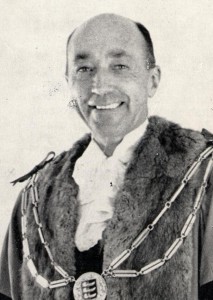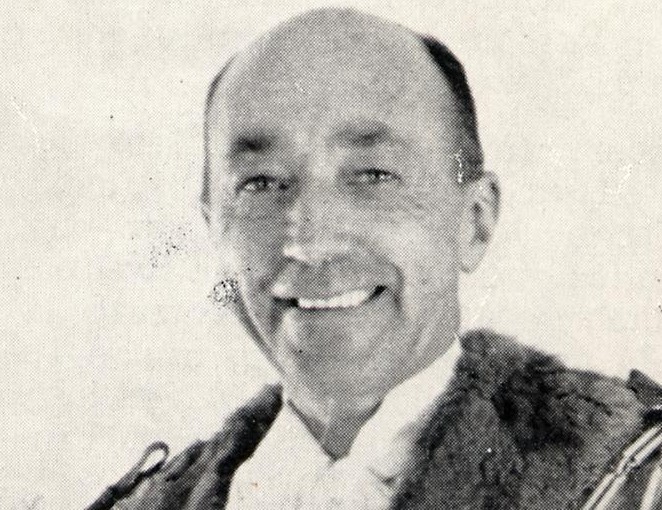– an occasional series by William Shepherd
No. 1. Alfred Horner
I chanced across Richard Horner in Jempsons the other day as I was reading my copy of the March edition of ‘Rye’s Own’ and we got to chatting about this and that. In passing I remarked that there was plenty of mention of the Horner name in the March issue with Richard passing on the information he got from Larry Hatter about the good ship ‘Cadbro’ on page 12, two mentions on page 30 including his own letter about the artist William Warden and some very complimentary remarks about his father ‘the legendary Alfred Horner’ in the interview with Geraldine Bromley on Page 18. Well one thing led to another and in no time I was being introduced to some fascinating snippets of Horner family history. Here are just a few of them.
Way back in the mists of time, the Horners hailed from Yorkshire. In the middle of the last century two brothers, John and William Horner left home and traveled around the country opening up Methodist church schools. Somewhere in the Horner family tree is a Caroline Bourne, a Wesleyan Sunday School teacher but there is no evidence to suggest that she was related to any of the Bournes in Rye. But what we are certain of is that William Horner settled down in Rye in the 1860s. Alfred Horner is William’s grandson.
Alfred Horner was known by many Ryers still alive today as the proprietor of Horner’s Corner Stores before he became famous as a councillor and Mayor of the Ancient Town. Before the Hitler war, shopkeepers in towns like Rye were much more than mere dispensers of groceries and in Rye this tradition continued well into the 1960s.
At Horners, Wednesday was Delivery Day. Alfred sometimes took the delivery bike but, not being a driving man himself, he had Bernard Wilson to drive the delivery van. Richard remembers being home one particular Wednesday when his father came all the way back from over East Guildford way, a round journey of well over an hour, for a box of six Oxo cubes. Back then the idea that ‘the customer was always right’ was clearly not ‘all spin and no delivery’ as William Hague might say. It actually meant something. Richard also told me that because his father was a St John’s Ambulanceman, he often found himself called upon to deliver first aid along with the groceries. It seems that washing a customer’s feet, bandaging an ulcerated leg for an elderly gentleman or applying a poultice to an old pensioner’s arm were all part of a day’s work.
The Horners were a busy family. While Alfred was running his grocery store and getting the ‘Rye Bonfire Society’ back into business after the war, his wife…maiden name of Florence Blackhall…was running the shop by the Landgate that we know as ‘Emsons’. The Blackhall family can trace its roots back to Oxfordshire in the late Middle Ages. It took them four hundred years to find their way to Rye but they arrived here some time around 1800. Nowadays you will find them in the most unlikely places. Who for instance would have guessed that Mick Hodgson, Colin Marsh and Richard Horner are all related through the Blackhall line? One of the stories that Richard Horner remembers featured Bill Hicks and the house Bill rented at 26 Ferry Road. It was set in the early 1960s. For several years Alfred Horner had been collecting Bill’s rent from him on the Wednesday and passing it on to his landlord. But then Bill went into hospital. One Wednesday, several weeks after Bill had been admitted, Alfred arrived at the door of number 26 to find the landlord busy throwing Bills’ things out onto the street. ‘You can’t do that.’ said Alfred. ‘Try and stop me.’ replied the landlord. ‘He won’t come back and I need the place.’ Alfred was having none of it and decided he would stop him…by buying Bill Hick’s house. ‘How much do you want for the house?’ he asked. To cut a long story short, Alfred bought the house although it seems he paid more than the house was worth. Alfred was ‘taking things on’ in this manner all the time.
Eventually Bill was discharged from hospital but neither he nor anybody else, including Florence, knew anything of what had gone on in his absence. As far as Bill was concerned he carried on paying his rent to Alfred Horner on Wednesday just as he had always done. What was different of course was that his rent no longer went to his old landlord but to Alfred Horner. Of course the Horners could not really afford to pay top whack for the house so when Florence eventually discovered what Alfred had done she hit the roof. When Bill died in the early seventies they decided to do the place up and sell the Ferry Road house.

In Winchelsea Church there are records of a marriage in 1810 between Frank Thomas Blackhall and Elizabeth Haisell. Florence Blackhall was a direct descendent, born a hundred years later in 1908. Her father’s name was Francis Thomas Blackhall and he married an Ilford girl, Myra Thompson. On the barges here in Rye, he was known as ‘FT’.
In the 19th century Vidler & Co. owned quite a number of barges and worked the Rother water trails. One of the barges was called ‘Rother’. FT worked on the ‘Rother’. But that was not all he did. He also worked as the local union representative for the Rother Bargemen. In this he was so successful that old Alfred Vidler was forced to give the bargemen a pay rise. He did it with surprisingly bad grace. His bargemen got their new bigger wage packet with one hand while ‘FT’ was given his cards with the other. This victimising of union officials was normal practice at the end of the last century before being made illegal in this country by an act of Parliament.
FT also had the distinction of being the last man to run a ‘cargo of beach’ up to Newenden. Richard was not sure what put an end to the boulder runs from Winchelsea Beach up to Bodiam Castle but he thought it might have been the problem of getting under Newenden Bridge.Talk to Mike Berry the new chairman of the Rye Harbour Boat Owners Association and the boss of the Bodiam Ferry Company and you will hear much the same complaint. Several times last season he had to cancel trips to Bodiam Castle. The reason? There was so much water in the river that ‘m/s Dannie Lee’ could not get through the arch of Newenden Bridge. The more things change the more they stay the same.
Comparing our current Rye councillors with Alfred Horner’s generation is rather like asking if Freddie Trueman would have got Don Bradman out before lunch on the first day…or whether Sam Bartram was a better goalkeeper than Peter Schmeichel. We will never know.
But one thing we do know is that in Alfred’s day the ancient town of Rye had power over its own affairs. It may have been in decline, but it was its own fault that it was in decline. Like Exeter and many other English ‘port-towns’…these are different to ‘market-towns…Rye had made the mistake of turning its back on its maritime heritage.
Many people in Rye believe the rot really set in when the town lost its borough status in 1972. If this is so then the sooner Rye takes back the power that was snatched away from it, the sooner work can get underway to improve the town for the benefit of the people who live here.
It was Jack Priestley, the author of ‘The Good Companions’ who wrote that things would start to improve when people started treating the place they lived in as if it were their home. And he would go on to say that women knew much better than men what they wanted from a home. But we can talk about that some other day.
Finally let me pose a question. How would Alfred Horner have gone about taking charge of Rye? And here is the supplementary question…just like in the Westminster Parliament… how would ‘FT’ Horner have approached the job? Answers on a postcard please to ‘Rye’s Own’.
